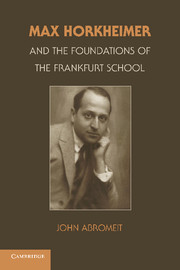Book contents
- Frontmatter
- Contents
- Acknowledgments
- A Note on References and Permissions
- Introduction
- 1 Coming of Age in Wilhelmine Germany
- 2 Student Years in Frankfurt
- 3 A Materialist Interpretation of the History of Modern Philosophy
- 4 The Beginnings of a Critical Theory of Contemporary Society
- 5 Horkheimer’s Integration of Psychoanalysis into His Theory of Contemporary Society
- 6 Horkheimer’s Concept of Materialism in the Early 1930s
- 7 The Anthropology of the Bourgeois Epoch
- 8 Reflections on Dialectical Logic in the Mid-1930s
- Excursus I The Theoretical Foundations of Horkheimer’s Split with Erich Fromm in the Late 1930s
- Excursus II Divergence, Estrangement, and Gradual Rapprochement
- 9 State Capitalism – The End of Horkheimer’s Early Critical Theory
- Epilogue
- Selected Bibliography
- Index
- References
Introduction
Published online by Cambridge University Press: 05 June 2012
- Frontmatter
- Contents
- Acknowledgments
- A Note on References and Permissions
- Introduction
- 1 Coming of Age in Wilhelmine Germany
- 2 Student Years in Frankfurt
- 3 A Materialist Interpretation of the History of Modern Philosophy
- 4 The Beginnings of a Critical Theory of Contemporary Society
- 5 Horkheimer’s Integration of Psychoanalysis into His Theory of Contemporary Society
- 6 Horkheimer’s Concept of Materialism in the Early 1930s
- 7 The Anthropology of the Bourgeois Epoch
- 8 Reflections on Dialectical Logic in the Mid-1930s
- Excursus I The Theoretical Foundations of Horkheimer’s Split with Erich Fromm in the Late 1930s
- Excursus II Divergence, Estrangement, and Gradual Rapprochement
- 9 State Capitalism – The End of Horkheimer’s Early Critical Theory
- Epilogue
- Selected Bibliography
- Index
- References
Summary
To judge something that has substance and solid worth is quite easy; to comprehend it is much harder; producing an adequate representation of it, which unifies judgment and comprehension, is the most difficult of all.
Hegel, Preface to the Phenomenology of SpiritWhy a new study of Horkheimer and early critical theory?
This study has two main purposes, which overlap but are not identical. First, it is intended as a comprehensive intellectual biography of Max Horkheimer from 1895, when he was born, to 1941, which marks the threshold of a new phase in Horkheimer’s life and thought. Several excellent general studies of the development of Critical Theory as a whole have been written. However, the publication of Horkheimer’s Collected Writings and the opening of the Max Horkheimer Archives have made available much previously unknown or unavailable material, which has made a reassessment of Horkheimer’s work possible. This study draws on this material as well as the extensive secondary literature on Horkheimer in German and the much less extensive literature in English. In general, the focus is directed primarily – and unapologetically – to Horkheimer’s thought. Examination of the biographical details of Horkheimer’s life or the lives of those who influenced him is in most cases limited to what is necessary to explain the development of his ideas. In the first two chapters, which treat Horkheimer’s childhood, youth, and student years, more attention is devoted to biographical context. Beginning with the third chapter, Horkheimer’s theoretical work and those writings of his colleagues, which contribute to an understanding of his own writings, become the central concern. Although I have sought to refer to and build on earlier scholarship rather than repeat it, some repetition has been unavoidable in order to present a coherent narrative. To be sure, I have drawn on previous, general treatments of the history of Critical Theory, such Martin Jay’s still unsurpassed Dialectical Imagination and Rolf Wiggershaus’s The Frankfurt School, but I have also sought to revise and deepen their accounts, when necessary. In addition, the principal and subsidiary arguments presented here have been developed in dialogue with a number of other authors who have written studies that either focus primarily on Horkheimer or present particularly incisive or influential interpretations of his work.
- Type
- Chapter
- Information
- Publisher: Cambridge University PressPrint publication year: 2011



